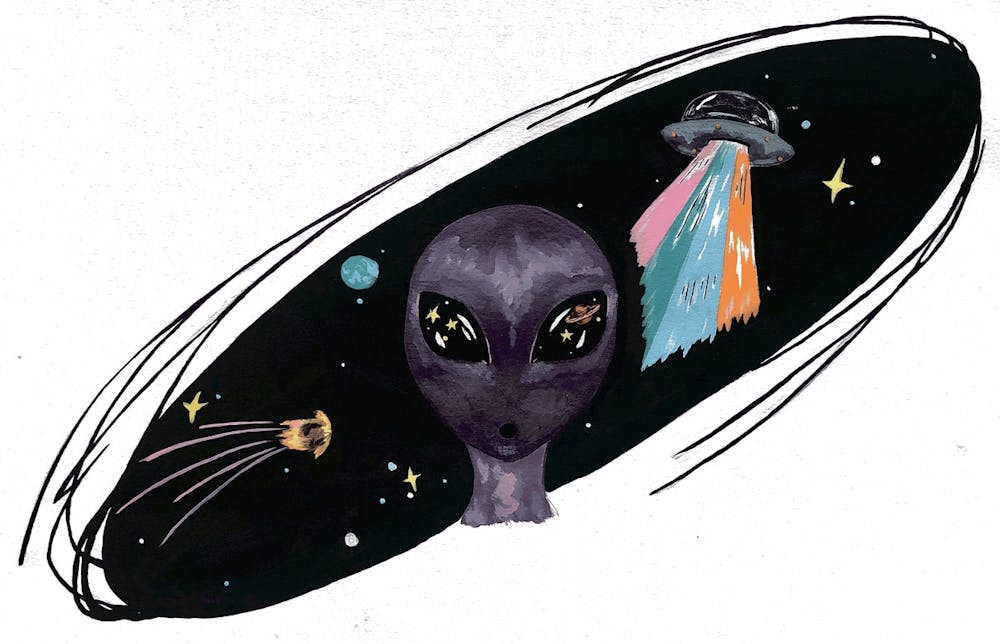Colonies growing on petri dishes, plants bolting from pots, stem cells splitting — while many University researchers are focused on the samples available in their labs, one is interested in exploring something that may not even exist.
In his book published earlier this year, Professor of Physics Stephon Alexander explores the role bizarre thought experiments have in science. A chapter of his book “Fear of a Black Universe” includes a “crazy” thought experiment to continue discussion on the search for alien life in the universe, according to Alexander.
“The possible existence of intelligent extraterrestrials touches upon the most fundamental aspects of human existence,” wrote Harvard astrophysicist Abraham Loeb in an email to The Herald. The implications of alien existence loom too large to be captured by equations, and extend well beyond academia, added Loeb, who was not involved in writing the book.
Currently, scientists look for alien life by using a large array of telescopes, Alexander said. In the thought experiment discussed in his book, Alexander supposes that there exist alien civilizations running quantum computers 一 computers that do not use the standard binary structures of zeros and ones, but instead use quantum physics properties. The experiment proposes that these hypothetical aliens would require a vast amount of computing power, likely beyond the scope of traditional non-quantum computing.
It’s a “fun exercise” to imagine an advanced alien civilization that knows how to make and build a quantum computer, Alexander said. Assuming the existence of such a civilization naturally leads to the question: “Would an extreme amount of very distant quantum computation result in any astronomically observable effect?”
Unlike astronomers stargazing from their backyards, some techniques for observing across the vast distances of space rely on signals other than visible light. For instance, researchers recently made waves after detecting minute gravitational waves that originated from the collision of two black holes — 1.3 billion light years away.
“Could we humans see evidence of a universe teeming with quantum computers by carefully examining the night sky?” Alexander wrote in his book.
Alexander expanded on the relevance of the possibility that there are aliens using quantum computers, postulating this could explain the mystery of dark energy, which remains a poorly understood area of physics. “These quantum computers would require a big reservoir of energy. Maybe they’re getting the energy from dark energy,” Alexander said. Scientists believe dark energy to make up the majority of energy in the universe based on some models and appears to behave differently from the matter we are familiar with, though it is unclear why.
“At present there is no solution to the dark energy problem. Prominent physicists like Ed Witten have called it the greatest embarrassment of theoretical physics,” Alexander wrote in his book.
The premise of coming up with this thought experiment was to explore, Alexander said. “Before you have a theory, sometimes you have to come up with a thought experiment, and sometimes it needs to be very wild.” Such ideas can be a way to make progress on problems that are unsolvable, according to Alexander.
“Thought experiments are a way of stretching our brains to see what new ideas they can handle,” wrote Jaron Lanier, who contributed to the thought experiment, in an email to The Herald. “In this case, we pushed ourselves to rethink a number of questions at once including … the far, far future of quantum computation,” added Lanier, who is a computer scientist and is considered a founder of virtual reality.
Thought experiments can make modern physics accessible to non-experts by having fun and exploring “crazy ideas,” Alexander said.
“It’s a little like going on an exotic vacation and gaining a new perspective,” Lanier wrote.

Jared is a Senior Staff Writer for Science and Research. He is a senior from Albuquerque, New Mexico studying physiology and biotechnology. Outside of The Herald he likes to fish, ride bikes and research the role of metals in human health and disease.





